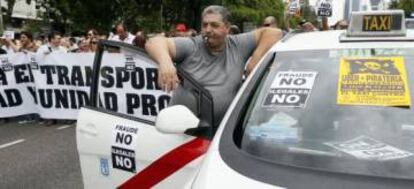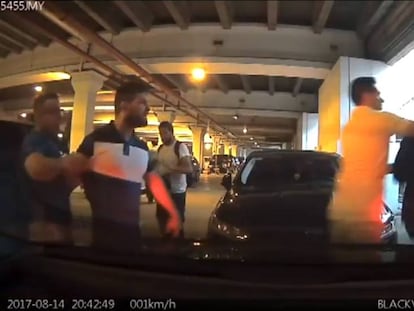As Uber plans Barcelona comeback, taxi drivers prepare for new battle
After already leaving the city because of legal problems, the ride-hailing company could face fresh trouble


Uber, the company that connects drivers with passengers through a smartphone app, is planning to return to Barcelona. After leaving the Catalan capital in December 2014 due to reiterated complaints by taxi associations, the San Francisco-based group has altered its business model.
“We are changing the way we work. And Barcelona is no exception. We want to work with local agents to help build a mobility model that is more sustainable,” said the company in a statement.
The company has long shown a special interest in the Catalan capital
But taxi associations in Barcelona are already getting ready for more protests if Uber makes a comeback.
Before leaving Barcelona, the company was operating a peer-to-peer service called UberPop, which allowed non-professional drivers to pick up passengers along their route.
But in late 2014, a Spanish court ordered Uber to stop operations in the country after a complaint from a taxi association and numerous protests from the sector, which staged nationwide taxi strikes. In March 2016, Uber made a comeback in Madrid with UberX, which puts riders in touch with drivers holding VTC (chauffeured private hire) licenses. Taxi drivers have protested against these licenses as well.
In a further legal setback, in December 2017 the European Court of Justice ruled that Uber is in fact a transportation company, not just a digital platform for mediation between drivers and passengers, as the company had alleged.

But news about Uber’s plans to return to Barcelona have put the taxi industry on alert once more. “Everything is really calm now, but the instant Uber sets foot here, it’s going to be a mess. We cannot control what happens on the streets when their cars start rolling out,” said Tito Álvarez, spokesman for Elite Taxi Barcelona, the taxi association that brought the successful legal challenge against Uber before the European Court of Justice.
Fedetaxi, another industry group, is taking things more calmly. “For now we are not considering any demonstrations,” said its president, Miguel Ángel Leal. “Uber wants to have a presence in the large capitals. Let’s hope it observes transportation regulations; we urge authorities to exercise oversight on its activities.”
The company has declined to provide a specific date for its return to the city, although the digital daily Vozpópuli said that this information will be released within the next two weeks.
Uber also declined to comment on any new potential protests in Barcelona, Madrid or any other city. Chief executive Dara Khorowshahi has said in recent months that the company aims to work together with taxi drivers.
The company has long shown a special interest in the Catalan capital because of its tourist influx and potential for business. While there are no official figures on the number of visitors to the city, Catalonia as a whole welcomed 19 million foreign tourists, according to figures released by the National Statistics Institute, representing 23.3% of all international arrivals in Spain.
English version by Susana Urra.









































